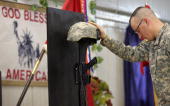Feb
23
PTSD: Community and Family Scars
Filed Under Treating PTSD
Last Thursday, Tony and I appeared on KGAB radio in Cheyenne, WY, followed by a book signing at a local book store. Our host, Dave Chaffin was a kind and thoughtful interviewer, much like Lorin and Dixie Ricker in Castle Rock. The broadcast was pretty typical for a book interview. That is, until listeners began calling into the station. We were talking about how a soldier’s neuro-network had been altered to react to combat threats and danger, and who when the individual returns home, his/her brain is still configured for combat and threat. For example, driving hazards are commonplace to everyday Americans. Road rage, stop & go traffic, debris alongside the roadway are all common occurrences. The combat veteran, however, can experience many of these things as a potential threat. A threat that can have a life and death consequence. An elderly lady phoned to tell of us of an experience she had while driving in downtown Cheyenne. She explained that while approaching a street light she had to stop quickly to avoid running the red light. The car behind her immediately whipped into the adjoining lane and the driver got out of his car, angrily walking toward her. She noticed he was wearing military fatigues. His face and demeanor were quite frightening to her, so she picked up her cell phone to call the police. Upon seeing this, the soldier turned and went back to his truck and left. The lady got his license plate and relayed the information to the police who contacted his commanders. What they discovered was this: The soldier had recently returned from Iraq and was having some severe adjustment problems. They asked the woman if she wanted to press charges, but she kindly declined. By no means does serving in combat excuse a person from inappropriate behavior, yet, it does show that combat PTSD can and will affect more than just the veteran and his/her family. It can impact the entire community in various ways, some that can be very negative. So the real message again is: “IF WE SEND THEM, THEN WE MUST MEND THEM”. For every one’s sake!
Another story: While at the book signing, we meet a young man in his early thirties. Initially, he wasn’t at all interested in purchasing our book, but he was intrigued by the title. When he sat down to chat, he began telling his story. He spoke of a stepfather who served in Vietnam and was incredibly cold, irritable, aggressive and cruel. Actually, he didn’t have a kind word to say. When we told him about the effects of combat and PTSD, he bought the book. His reason: Perhaps, he said, if he understood better what was going on with his step-dad, he might just be able to forgive him and lessen his own anger and hatred. The tragedy of this young man’s story is the fact it will be repeated over and over again unless, as a country, a community, and a family, we begin to build a greater awareness of how challenging trauma is to the well-being and health of everyone. PTSD is not a condition we can afford to disregard. The consequences will be too enormous and the costs, both economically and morally, too high!


